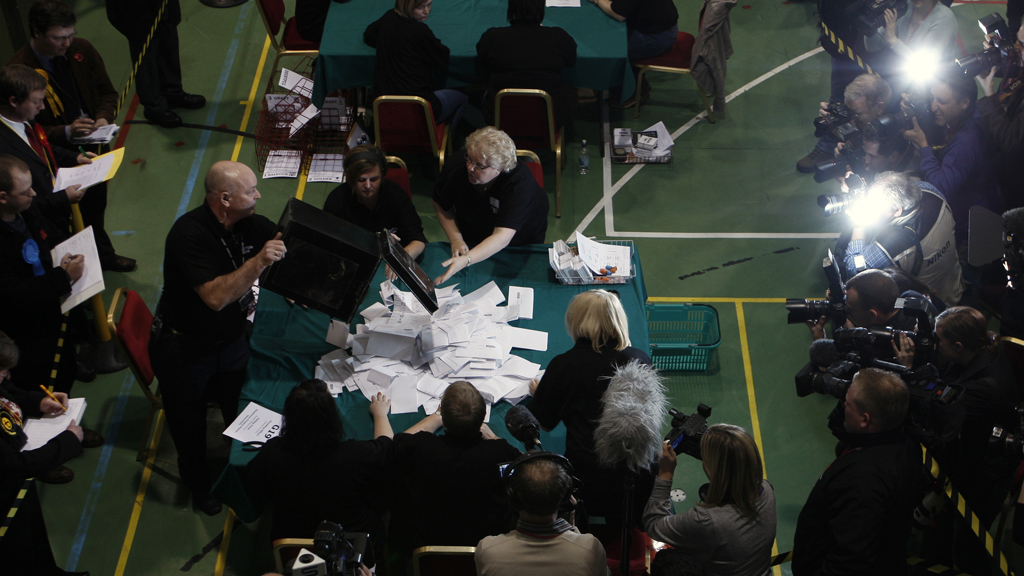Election 2015: three potential banana skins before the vote
The general election is exactly a year away and predicting a winner has never been harder. Channel 4 News looks at three banana skins that could change everything.

Only one thing is certain about the 2015 general election: it is exactly a year from now, writes Kunal Dutta.
Five-year, fixed-term parliaments, a condition of the coalition agreement, has put an end to previous governments’ ability to call a snap election. What we are left with is a definitive 365-day countdown starting today.
Parties are all too aware of the importance of this format. In 2010, a whopping 57 per cent of voters are thought to have made up their minds before the final three-week finish had even started. Making their case now has never been more important.
Follow our election countdown Twitter feed here: @C4Election
Such steps have already been taken. Look no further than David Cameron’s vehement appeal to Christian voters during Easter; Ed Miliband’s signing of President Obama’s chief adviser, David Axelrod, or Ukip’s latest campaign to counter perceptions as the party of racists.
These are just a few of the steps taken to try and manoeuvre parties into position as the next 365 days count down. But can each steer safely to the finish line?
Here are three potential banana skins in the months ahead.
Banana skin 1
Scotland going independent
The Scottish referendum on 18 September is, as one pollster described it, “the greatest known unknown”.
Opinion is divided on what effects independence would have on the general election. Reports that it would trigger David Cameron’s resignation seem far-fetched, but it would almost certainly raise questions.
As Professor John Curtice of the British Polling Council told Channel 4 News: “David Cameron would effectively have become the first prime minister to preside over the break-up of the United Kingdom. It is an easily digestible soundbite that would become a very alluring theme.”
For Labour the consequences would be devastating. While David Cameron would lose just one seat, Ed Miliband could automatically lose as many as 41 MPs – making the party’s attempt to secure a majority even harder.
Little wonder there have been some strong voices in the no campaign, not least the former prime minister Gordon Brown and former chancellor Alistair Darling.
Banana skin 2
Ukip splitting the Conservative vote
The European elections on 21 May are expected to be Nigel Farage’s moment in the sun. The polls and strong performances in the TV debates with Nick Clegg have raised the Ukip leader’s profile for the better – threatening to be a continuous thorn in the side.
Yet Ukip is never too far away from a banana skin of its own dropping. Political clangers from members and former members, such as Godfrey “bongo bongo” Bloom, David Silvester, the councilor who attributed the winter floods to gay marriage, and William Henwood, who said Lenny Henry should emigrate to “a black country”, cement impressions of racism inside the party.
That could put off certain Tory voters considering switching to Ukip in 2015 – especially if it continues.
Many believe the European elections are something of an anomaly and should not be read as indicative of next year’s results. Nonetheless a Farage victory would certainly add to their momentum and offset some of the party’s current image problems.
Banana skin 3
The destination of disaffected Lib Dems
The Lib Dems instantly lost a large chunk of support after joining the Tories in coalition, then a second big chunk after the tuition fee fiasco at the end of 2010.
Their figures then flatlined at about 10 per cent in the polls – until sliding again in the wake of Nick Clegg’s television debate with Nigel Farage over Europe. But where will disaffected Lib Dems go? Labour is certainly hoping to cash in, as will the Green party.
But Martin Boon of ICM poses a warning. He told Channel 4 News of the “spiral of silence” that has echoes of the 1992 election where “shy Tories” were too embarrassed to admit they supported John Major’s unpopular government, and promptly voted for him in the privacy of the polling booth.
Mr Boon warns the same could happen again. “The Lib Dems are suffering huge image issues that most simply don’t want to be associated with.”
But that is changing. With the economy improving, and questions over Ed Miliband’s prime ministerial suitability, disaffected Lib Dems could be one of the most underrated elements of the next election.
Undeclared voters who decide to “stick with Nick” could have a damaging effect on many parties, not least Labour.